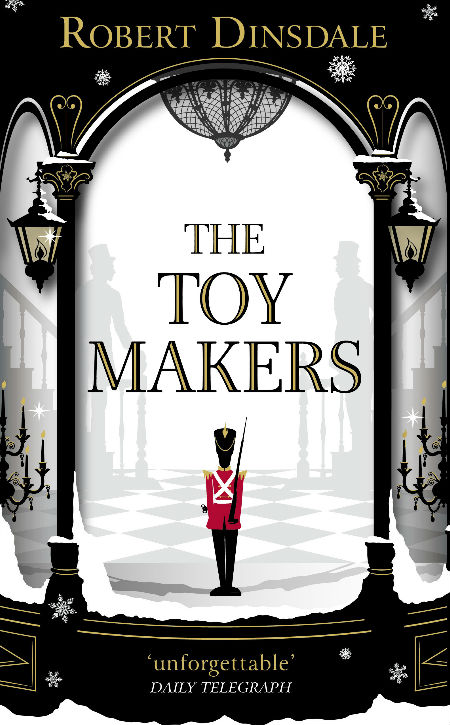
Who hasn’t, at one time or another, wished for a little more magic in their lives?
In Robert Dinsdale’s The Toymakers, there is fantastically magical realism in abundance but you end up questioning much of the time, even in a book as beautiful as this often but not always is, whether it has really done any of the characters, particularly young Cathy Wray, any real good.
Cathy, pregnant at 15 and the shame of her family, decides to run away in 1906 to London rather than face losing her child to a nameless adoption; ending up, via an ad at the wonder and childlike fabulousness of the Emporium, an expansive toy shop like no other run by Papa Jack and his sons Kaspar and Emil, she comes to find herself intricately webbed into a new family who despite their best efforts are not as magical as their creations.
It’s their toys, their amazing, defying-reality toys, that bring the crowds back every year at the first frost of winter every year – patchwork animals that seem to come alive of their own accord, paper trees that are more real, it seems, that their botanical cousins, and soldiers, beautifully-painted, realistic soldiers that fuel the playtime imagination of many a devoted young boy.
“The Emporium opens with the first frost of winter. It is the same every year. Across the city, when children wake to see ferns of white stretched across their windows, or walk to school to hear ice crackling underfoot, the whispers begin: the Emporium is open! Christmas is coming, and the goose is getting fat …” (P. 1)
It’s a place of endless wonder and magicality, the sort of toy shop, described in breathlessly imaginative detail by Dinsdale, that many of us would’ve given our right arm to visit and buy from when we were young.
And yet for all the escapist brilliance of the Emporium, which explodes alive in your imagination thanks to Dinsdale’s seemingly endless ability to conjure one miraculously impossible toy after another into existence, not everything is as magical in the lives of the Godmans, the creators far more troubled than their Toy Story-autonomous toys.
While Papa Jack, who nurses considerable life scars of his own, remains largely in his workshop eyrie high in the Emporium which, much like the TARDIS, is much larger on the inside, exuberant, talkative Kaspar, who possesses his father’s gift for turning the ordinary into the magically extraordinary, and dour, taciturn, thoughtful Emil, once close as brothers, are locked in a Long War for dominance, both on the toy soldierly field of battle, but for the mantle of heir to their father’s amazing creation, itself an antidote to the bleak cruelness of life outside the safe confines of Iron Duke Mews.
There is no doubt they love each other, but beneath all that familial care, borne of a childhood where they only had each other on which to depend, sits a rivalry that over the course of the book, which covers the period 1906 to 1953 and beyond, breaks down in ways shocking and almost absurd.
Suffice to say that Cathy, who finds a place to call home when none seemed to beckon, is largely happy with her choice, although as the languorous narrative, in which the reality of family relationship intrudes more often than not, unspools, she realises there are secrets aplenty and troubling motivations that no amount of extravagant displays and near-sentient playthings can mask.

That all makes The Toymakers seem ominously doom-filled, but the truth of the matter is that it is more a battle between reality and magical reality that fuels its pages more than anything else.
Life is, if nothing else, an endless back-and-forth between what we wish for and what we get, and even when we aim for the stars and manage to get somewhere near to those lofty celestial reaches, existence is never quite as wondrous as we envisage.
That’s not say there’s plenty of wonder in this mostly gorgeously-engrossing book for there is, and in inner child-thrilling abundance, but the stark fact of the matter is that life, in the most tenaciously stark and discomforting of ways, will find a way, and we make some accommodation for that or we perish.
Of course, as we know all too well, making that accommodation even if we want to, can be hellishly difficult, and when World War One and financial realities intrude, each of our characters finds that the bucolically world of otherness they have sought, and largely succeeded in creating can’t fix everything, despite their best, reality-distorting efforts.
“Emil had taken his notebook to bed, as had been his practice ever since he was a boy, but the marks he made tonight were scrappy and inconsequential. He drew the face of a soldier, supposed to be as regal as the Imperial Kapitan, but instead the image looked bedraggled, worn, like a body whose soul had been spent. Like Kaspar, Emil caught himself thinking – and promptly scoured the image clean away. He had not yet told their father about the scene Kaspar had made in the glade of the Long War this evening; he wondered if he ever should.” (P. 290)
At 468 pages, The Toymakers doesn’t always live up to its initial promise, with the final act, arriving well after you’ve concluded, erroneously as it turns out, that the narrative has run its full course.
You know it hasn’t since, of course, there’s still a reasonably healthy clutch of unread pages still caught up in the grip of your right hand but there is a sense of finality towards the end when Cathy and her daughter Martha find themselves well beyond the Emporium, many years down the track, and you assume magic has lost to the cold, dead but not entirely unwelcoming, hand of reality.
The truth is The Toymakers never surrenders the magical possibilities of life to the mundanity of survival and familial discord, always believing and demonstrating that with enough love and hope, and Cathy for one holds fast to these two qualities well beyond when she should have given up and just surrendered to what feels like the inevitable, her optimism-laced tenacity described, as so much is in this book, by the deliciously-poetic prose of Dinsdale.
One of the rich rewards of this book, which grants the heart and the imagination equal parts excitement and wonder, is the writing which is rich, plump with emotion and descriptive beauty, and an innate understanding of what it’s like to be feet-of-mud human while desperately, always wanting to reach for the stars.
It often leaves us caught awkwardly and frustratingly somewhere in the compromised middle, but as The Toymakers makes clear in its wholly satisfying end, that manages to be both dark and uplifting, perhaps all that effort is worth it and the magic will triumph when we least expect it.